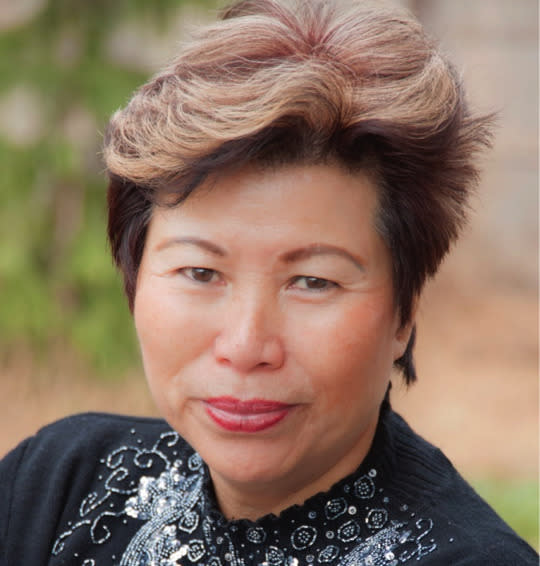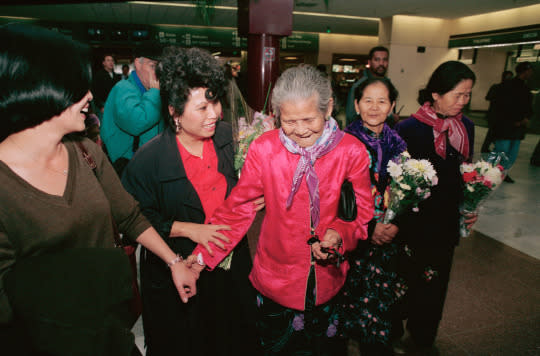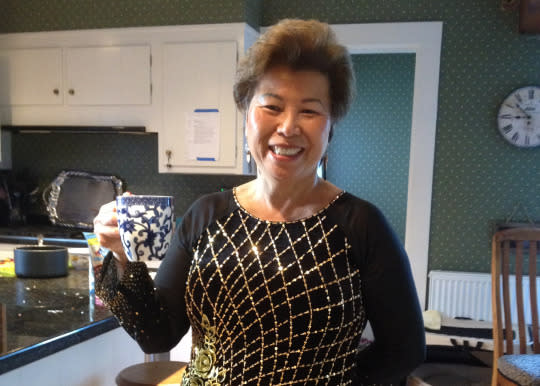Remembering Vietnam: Le Ly Hayslip Looks to Obama and Kerry With Hope

Le Ly Hayslip. (Photo: Charlie Fields)
By Jamie Reno for Yahoo News
On Sunday, President Obama arrives for the first time in Vietnam to begin several days of meetings with Vietnamese leaders in Hanoi and Ho Chi Minh City on such issues as the economy and human rights.
The talks are also expected to touch on lingering issues from the Vietnam War, including perhaps the ongoing U.S.-Vietnam effort to decontaminate dioxin residue in the central Vietnam city of Da Nang, the site of a U.S. air base during the war.
Da Nang had one of Vietnam’s highest levels of dioxin, a contaminant of Agent Orange, which along with other toxic defoliants was sprayed by the U.S. military over enormous swaths of Vietnam from 1961 to 1972 to flush out the enemy and destroy food crops.
One person who will be watching Obama’s four-day Vietnam visit with impassioned interest is Le Ly Hayslip, the philanthropist and author who grew up in a small village near Da Nang.
Hayslip, 66, gained international attention with her 1989 memoir, “When Heaven and Earth Changed Places: A Vietnamese Woman’s Journey from War to Peace.” The heart-rending book chronicles how Hayslip’s life as a Vietnamese peasant girl changed dramatically when American helicopters landed in her village when she was 12.
When Hayslip was born in 1949, Vietnam was a colony of France, but communist rebels were fighting for independence.
During the day, government troops occupied Ky La, Hayslip’s village, but at night, the Viet Cong controlled it — and Hayslip and her family were caught in the middle. She worked for the guerrilla fighters for two years and was often questioned by government troops, who would sometimes torture villagers to get information about the Viet Cong.
Eventually, Hayslip said, the Viet Cong suspected she was a government informant, and sentenced her to death. The Viet Cong agents were supposed to kill her, but instead, two of them raped her and let her go. Shunned in her village, she fled to Saigon and eventually made her way to the U.S. while the war still raged.
“I want this meeting to actually be productive, not just a show,” said Hayslip, whose book, along with the follow-up, “Child of War, Woman of Peace,” were the basis for the 1993 Oliver Stone film, “Heaven & Earth,” the director’s third installment in his trio of Vietnam War-themed films (“Platoon,” “Born on the Fourth of July”).
Since “Heaven & Earth” was released 22 years ago, Hayslip has mostly avoided the spotlight to focus on philanthropy. But in an exclusive interview with Yahoo News, she said Obama and Secretary of State John Kerry — a Vietnam War veteran who will accompany Obama on this trip — have an opportunity to make a “huge difference” in the lives of the Vietnamese people in just the few days they are in country.

Le Ly Hayslip, author of “When Heaven and Earth Changed Places,” second from left, shares a laugh with her mother, Tran Thi Huyen, center, and an unidentified friend, left, while Hayslip’s sisters — Phung Thi Xuan, second from right and Phung Thi Nghia, right — walk with them through San Francisco International Airport, Dec. 31, 1993, after arriving from Vietnam. Hayslip’s book was made into a movie by Oliver Stone — “Heaven and Earth” — that was released on Dec. 25, 1993. (Photo: Matt Sumner/AP)
“I admire President Obama and Secretary Kerry, but it would be a big shame if they didn’t address Vietnam’s real and dire problems, including the economic situation, while they’re in Vietnam,” she said. “There are still so few educational opportunities in Vietnam, there is very little access to decent health care, and there are rampant pollution and serious environmental issues, among other serious problems.”
Hayslip is still viewed by some in her native country and some Vietnamese-Americans as a traitor because as a young girl she sided with the Viet Cong.
But since coming to America, she has devoted her life to bringing Vietnam and the U.S. closer together and to providing development assistance to rural Vietnamese villages, like the one in which she grew up.
Through her East Meets West foundation and Global Village Foundation — which have been supported by the Bill Gates Foundation and philanthropist Chuck Feeney — Hayslip has provided the people of Vietnam a variety of services focused on basic human needs, such as drinking water, latrines and education, up to dental care and heart surgery. The list is long.
“I’ve been working in Vietnam for 30 years. I just returned from another trip there in March,” Hayslip said. “The U.S. could do a great service for Vietnam and for the survival of the human race if they told the Vietnamese government in no uncertain terms to address the natural environment.“
Hayslip cited such things as the estimated 100 tons of dead fish that have washed ashore recently on the coasts of the four provinces of central Vietnam. It has been called the largest ecological disaster in Vietnam’s history. No official cause for the massive die-off has been announced by the Vietnamese government.
But Hayslip and many others believe it happened because Vietnam’s neighboring countries put their industrial toxic chemical load into the ocean.
“It’s a tragedy that threatens to destroy Vietnam’s very way of life,” said Hayslip. She questions how the Vietnamese government can ask the U.S. government to fund millions of dollars to clean up their Agent Orange when Vietnam lets other countries dump their wastes in its coastal waters.
“Vietnam needs to better control its pollution,” she said. “The government also needs to reach out to the poor and needy villagers and children in remote villages with better health care and education. The gap between the rich and the poor is too overwhelming for people like myself to try to focus on from the philanthropic side.”
Hayslip, a twice-widowed mother of three grown children who still lives humbly in northern San Diego County, was recently diagnosed with breast cancer. She has already been through surgery and will begin radiation treatments this month.
But she still looks healthy, and she’s characteristically optimistic that she will beat cancer — and that the U.S.-Vietnam meetings will lead to real change. She’s especially encouraged that Obama included Kerry on this trip.

Hayslip at home this past October. (Photo courtesy of Le Ly Hayslip)
Hayslip noted that in 1994, Kerry, then a senator, called her personally to say he had tried to obtain entry visas to the U.S. for her family to attend the premiere of Stone’s movie.
She believes Kerry will have a say in how Obama addresses the issue of Agent Orange “because of his personal experience in Vietnam and with Agent Orange.”
In 2004, Newsweek reported that Kerry was exposed to Agent Orange while captaining a swift boat in the Mekong Delta during the war. In 2006, Kerry told this reporter that his best war buddy, Giles Whitcomb, died of non-Hodgkin’s lymphoma, which is now linked to Agent Orange.
Whitcomb was also exposed to Agent Orange while in the Mekong Delta, said Kerry, who urged the Veteran’s Administration to grant the Whitcomb family disability benefits for his late friend.
In addition to the countless American war veterans still suffering from exposure to Agent Orange four decades ago, Hayslip said, the impact the toxin has had on Vietnam is “impossible to measure.” Its effects are now appearing in the children and grandchildren of those who were exposed.
The Aspen Institute, a nonpartisan educational and policy studies organization in Washington, D.C., estimates that as many as 4.5 million Vietnamese civilians lived in areas sprayed with Agent Orange and other dioxin-contaminated herbicides at that time.
The Vietnamese Red Cross also associates exposure to Agent Orange with reproductive abnormalities, developmental disabilities and congenital deformities — such as cleft lip, cleft palate, club foot, hydrocephalus, neural tube defects, fused digits, muscle malformations and paralysis.
“I don’t think the American people realize just how devastating Agent Orange was and still is,” said Hayslip. “Obviously, Vietnam has no Veterans Affairs, no government health mechanism to cover civilians or war veterans who are still sick and still dying because of exposure to Agent Orange. Secretary Kerry has spoken out on this issue many times before. What will he do and say when he reaches Vietnam?”
Meanwhile, Hayslip’s once-controversial roller-coaster life is now on a slightly slower track. She used to receive death threats regularly from Vietnamese people and even some Vietnamese-Americans. But most Vietnamese people now seem to see her as a heroic figure — a survivor who always loved her homeland.
Hayslip’s newest vision, she said, is to do something for her beloved adopted country. She wants to create a vast cultural center in a rural, mountainous corner of north San Diego County that will combine Eastern and Western traditions, and “help and support troubled American war veterans and their families, cancer patients and their children, senior citizens who need love and attention, orphans and anyone who is heartsick. This will be for all people in this country, which has been so good to me for so many years.”
This story has been updated to reflect the actual number of Viet Cong soldiers Le Ly Hayslip says raped her: two, not 19.
